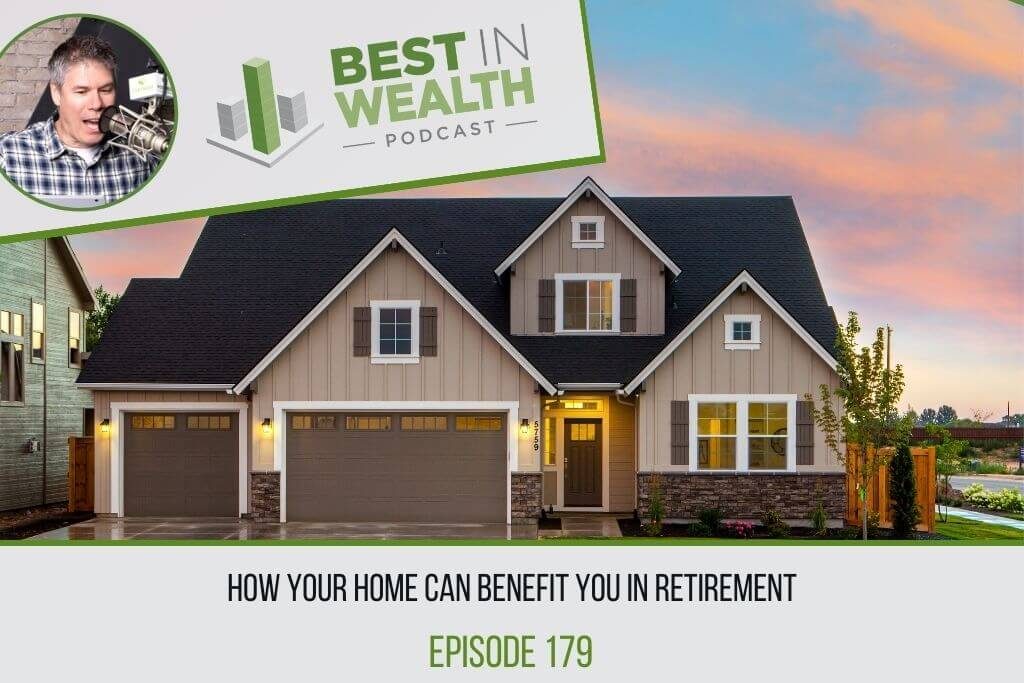How Your Home Can Benefit You in Retirement, Ep #179

Your home provides shelter, right? Homeowners’ houses are also investments—just like stocks and bonds. Unlike living in an apartment, you can bequeath your home to someone after you pass away. Houses—like any product or service—provide benefits. What are they? And can your home be a source of income in retirement? Listen to this episode of Best in Wealth to learn what your options are!
How can owning a home benefit you in retirement? Learn more in this episode of Best in Wealth! #wealth #retirement #investing #PersonalFinance #FinancialPlanning #RetirementPlanning #WealthManagement Click To TweetOutline of This Episode
- [1:10] My parents built their house and made it home
- [3:13] The three benefits of homeownership
- [11:51] Spending source and spending use pyramids
- [17:55] Four different ways to use your home for retirement
- [20:41] Do not let anyone talk you into a decision you do not want
The three benefits of homeownership
There are three types of benefits you receive when you own a home—and each one is important:
- Utilitarian benefits: What does something do for me and my finances? All houses provide shelter and protection. Your home value can fluctuate and be worth a different amount at a different time.
- Expressive benefits: What does something say about me to others and myself? Expressive benefits convey tastes and social status (i.e. having the money to buy a house in the first place).
- Emotional benefits: How does something make me feel? You may have peace of mind and security or experience the pride of ownership.
As a financial advisor, my job is to help clients understand these benefits from an investment standpoint. I am often asked if someone should buy or rent a home, pay off their mortgage, or sell their home and buy something smaller. The benefits you receive from your home influences these decisions.
Should you pay off your mortgage before retirement?
I usually coach my clients to pay off their homes if they can—but not always. I love the emotional and expressive benefits that come with homeownership. But interest rates are at 2–3%. It can make more sense to invest that money instead of putting it into paying off your mortgage. It feels right in my head—but not in my heart. Many of my clients need to pay their mortgage off to lower their monthly expenses and alleviate stress. It also adds stability to your life when the stock market is volatile.
Some people have zero emotional ties to their house and holding a mortgage is not a big deal to them. Others want to say “This is mine. No one can take it away from me.” Some advisors simply run the numbers, which will always tell you that you are better off keeping a mortgage. But it sets aside the emotional and expressive benefits of homeownership. Weighing all three leads you to the right decision for you. Everyone’s financial plans are different. Houses do not just play a role in our portfolios, but also in our lives.
Should you pay off your mortgage before retirement? I share a few thoughts—and other options—in this episode of Best in Wealth! #wealth #retirement #investing #PersonalFinance #FinancialPlanning #RetirementPlanning #WealthManagement Click To TweetSpending source and spending use pyramids
There are three layers in spending source pyramids.
- Consistent income: Part-time job, social security benefits, pension, or annuity.
- IRA or 401k: retirement accounts where you access them as a source of monthly income to bridge the gap between expenses.
- The things that you are going to give away someday. The top of this layer is typically your home. It can be a strategy for retirement income.
The spending use pyramid also consists of three layers:
- The things you must have: Food, shelter, support for children.
- What you want to have: vacations, new cars, and “unnecessary” expenses.
- The top layer consists of the things you will pass on to future generations (i.e., your house).
When you look at both, your house is at the top. Behavioral life cycle theory predicts that investors are reluctant to dip into things in that top layer. Your home equity makes up a large portion of your wealth. Most people do not sell their houses to support non-housing consumption.
Only 2% of Americans who are eligible homeowners choose to do a reverse mortgage on a paid-off house. It can add income for retirees for many years, yet most people do not do it because they are emotionally attached to their homes. But there are some cases where I can look at prospective clients and say they can retire early—if they are willing to do a reverse mortgage or downsize.
Four different ways to use your home for retirement
From a utilitarian perspective, there are four different ways you can use your home in retirement:
- You can downsize your home, purchase something far cheaper, and invest the difference.
- Sell your home and move to a cheaper location in the US or abroad.
- You can take out a reverse mortgage.
- Take out a home equity line of credit and use it for your retirement.
Above all, do not let anyone talk you into a decision you do not want before you work through all of the emotional and expressive benefits. The emotional benefits can be completely priceless. I cover each of these options in-depth in this episode. Listen to get the whole story!
There are 4 different ways to use your home for retirement. What are they? Listen to this episode of Best in Wealth to find out! #wealth #retirement #investing #PersonalFinance #FinancialPlanning #RetirementPlanning #WealthManagement Click To TweetConnect With Scott Wellens
- Schedule a discovery call with Scott
- Send a message to Scott
- Visit Fortress Planning Group
- Connect with Scott on LinkedIn
- Follow Scott on Twitter
- Fortress Planning Group on Facebook
Audio Production and Show notes by
PODCAST FAST TRACK
https://www.podcastfasttrack.com
Podcast Disclaimer:
The Best In Wealth Podcast is hosted by Scott Wellens. Scott Wellens is the principal at Fortress Planning Group. Fortress Planning Group is a registered investment advisory firm regulated by the Securities Act of Wisconsin in accordance and compliance with securities laws and regulations. Fortress Planning Group does not render or offer to render personalized investment or tax advice through the Best In Wealth Podcast. The information provided is for informational purposes only and does not constitute financial, tax, investment or legal advice.



